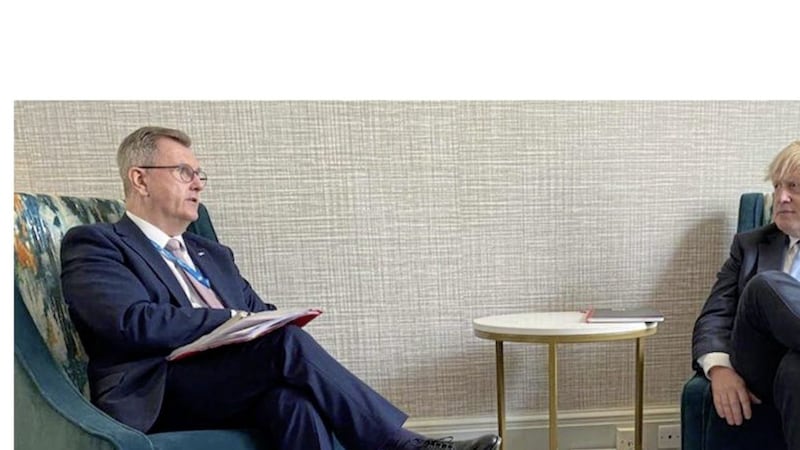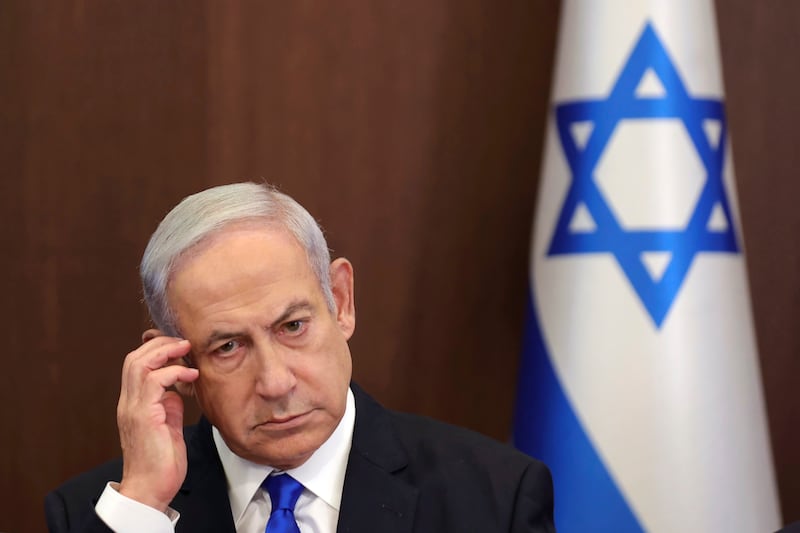HANDS up who has ever met anyone in real life who has mentioned the NI Protocol and its impact on their daily lives. No, Jeffrey at the back - I mean normal people, not those involved in unionist politics.
I always listen to conversations on buses, in cafes, bars and anywhere that is worth an eavesdrop – eary-wigging, my mum called it. But I have never, ever heard it raised.
That's not to say that I don't believe it matters to some people. And I have read about some difficulties with trade from GB into Northern Ireland, and worse, that you won't be able to order Christmas goodies from Marks & Spencer.
But it's surely nothing that a bit of proper diplomacy and good will could sort out with the EU. What a pity that it's Lord Frost who is in charge of the British diplomacy and good will in these negotiations.
It is hard to trust someone who negotiated the deal in the first place only to complain afterwards that he didn't expect it to be implemented.
Now he tells the Policy Exchange's Brexit panel that supply chains are being re-ordered and trade between north and south is actually going up because businesses are adjusting to the new circumstances.
He described this as "sad" and said action to stop it was needed urgently. It speaks volumes about this government's attitude to the interests of Northern Ireland.
The half-empty rooms at events at the Tory conference in Manchester where the issue was discussed were testimony to the lack of interest in our affairs across the water, despite the Brexit problems it is causing. No mention either in the Tory leader's speech.
Meanwhile, the Prime Minister says it's up to businesses themselves to sort out the problems of labour shortages and supply difficulties by not relying on low-wage immigrants.
It's basically a re-working of his famous quote during the Brexit campaign when he said, "F*** business."
The DUP leader has made his threats to collapse Stormont unless the Irish sea border is scrapped. Now it seems he's being given hints that some compromise will be reached to allow him to step away from the cliff edge.
Trusting Johnson again? Maybe Jeffrey would be better off applying for a HGV licence, just in case.
****
IT is always disappointing when someone you admire says something you don't like.
I met Colm Tóibín once when he came into the BBC for an interview. I had enjoyed his novels so was glad to find him friendly and gracious in person - as well as an excellent interviewee.
Alas, I read a piece he wrote for the Guardian last weekend and found my teeth grinding about half way in. He was talking about relations between Britain and Ireland post Brexit.
And like most of those from south of the border, when he talks about "Ireland" he only meant the Republic.
He spoke of the success of the queen's visit in 2011 and her references to the fact that many British and Irish families had close relatives living in each other's country.
Brexit would not change that, he wrote. "Irish soccer fans will still support English teams; Irish people still have cousins in England and go to England for work; Northern Irish people will still see Scotland as close to home. England still represents freedom for many Irish people."
All good. But then he said that while the southern Irish took their easy relationship to England for granted, they do not have a similar relationship to Northern Ireland.
He described it as "depressing" that Simon Coveney said he wants to see a united Ireland in his lifetime, a view echoed by Leo Varadkar and Micheál Martin. Would these politicians be planning to foist the dysfunctional health system and appalling housing crisis in the Republic on the people of Northern Ireland and import the north's sectarian hatred and politics of perpetual grievance into the south, he wondered.
Tóibín described this talk of a united Ireland as "mystical blather" which he believes is all about trying to neutralise the inexorable rise of Sinn Féin which has Dublin 4 quaking in its well-heeled boots.
It's depressing to find a writer of Tóibín's wit and imagination failing to see the possibility of a different Ireland not just a country built on the worst of both current states.
What also comes across when he talks about the need to understand the fears of unionists is the complete disregard for what northern nationalists want for their future.
The message is clear. Keep Northern Ireland "stable". And keep it far away from us.








